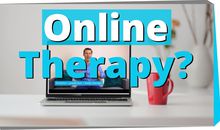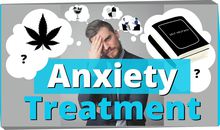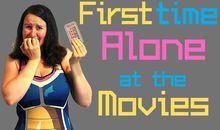Does online therapy for anxiety really work?
If you’re only looking to treat your anxiety with face-to-face therapy, you might be missing out on some awesome gains!
Look, I get it, based on what people are saying and suggesting, it feels like your thoughts, your anxiety, is weird and unusual.
People say stuff like,
“Don’t think like that”
“Don’t worry about it”
Which can give us the impression that no one else has anxiety or thinks like we do.
In reality, they’re generally concerned about us and want the disruptive interference of anxiety on our lives to be solved ASAP.
But brisk problem-solving can communicate that our thoughts are odd and maybe a bother.
It’s totally understandable given this, that you would think your thoughts are odd or faulty, and that you need very specific and personal help for your unique brain problem.
And don’t get me wrong, one-on-one sessions with a supportive and validating, psychologically healthy therapist can be an amazing experience, and is super helpful!
What I’m saying is that limiting yourself to ONLY a personal one-on-one process is leaving you stuck with only one option.
An option that is in short supply, hard to access and more expensive.
Not to mention that believing you’re that different from other human beings may leave you feeling unacceptable, weird, and on the outside of your friend-group, family and society.
See the thing is, when you have a particular kind of anxiety, there will be strong similarities to other people with that same kind of anxiety.
Anxiety Disorders are defined by the subject of the fear and the thinking process that drives it.
Let’s take Health Anxiety
The subject of the fear is Health and the thinking process involves hypervigilance of physical sensations that are interpreted as signs of illness and then worried about.
Or Social Anxiety
The subject of the fear is Social Situations (or judgement and rejection by other human beings) and the thinking process cycles around a negative image of self that is projected onto other people to create the sense that they are, or will be, thinking negatively of us.
And look, the prevalence of disorder-level Social Anxiety is over 14%!
It’s a very common unhelpful thinking pattern for humans.
We can really benefit from realising that there are certain skills that can help us with these common unhelpful thinking patterns.
We all need those skills to cope with life’s daily stressors and to develop into healthy effective people.
We can learn these skills through online therapy, i-therapy, or a structured online process.
I’m talking about something you can sign up to and get started on straight away, rather than teleconferencing with a therapist.
That’s just the one-on-one but via Zoom.
It’s not scalable, and thus it’s more expensive and is limited by the pool of therapists.
The online platform doesn’t have to be a cold, information-based place of learning either.
They can also include anxiety support groups that can help encourage us through our skill learning process, as well as practically demonstrate to us that we’re not crazy or alone.
And this doesn’t have to be INSTEAD of the one-on-one therapy!
Start learning these skills while you’re on a waitlist to see someone, or while you’re seeing someone.
When anxiety has such as negative impact on our lives, why wait?
Why not get working on it straight away?
We don’t limit ourselves to one-on-one help when learning other things.
We take group exercise classes and do online courses and there’s the classic example of school and university.
Why limit yourself when it comes to overcoming your anxiety?
“But isn’t that just like self-help? I’ve tried reading a book on this before.”
Well, some online anxiety courses are a bit like that.
Read through the material and self-motivate to do the work.
But, I’m talking about a more structured process!
There is lots of research showing that structured online anxiety courses can be as effective as one-on-one treatment.
This is where you get handed each piece of carefully selected material, presented in an attractive, easy to interact-with format.
Then you are encouraged to do each skill-based assignment in a step-by-step manageable way.
Sometimes they even include the opportunity to have group coaching or ask questions of a psychologist or anxiety specialist like me.
And that can be a nice bonus, giving you the best of both worlds in terms of accessibility, and convenience, as well as having the opportunity to have the material personalised to your situation!
Does online therapy for anxiety really work?
Yes – it’s well proven to really help with anxiety.
It’s also significantly more cost effective, easier to access, and involves no travel.
So why not give it a try? It generally comes with a no risk, money-back guarantee.
You could even combine it with getting on a waitlist to see someone face-to-face.
With how much anxiety gets in the way of you living, is there really a reason not to give online treatment a go?
Find out more?
If you want to find out the simple secret that can make all the difference to overcoming anxiety, come along to Becky’s next free Masterclass. She’ll cover this amazing secret and more.










